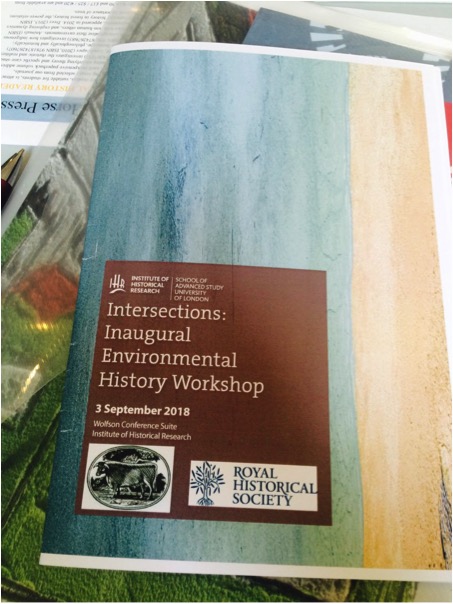In this blog John Morgan reports on last week’s inaugural Environmental History Workshop which we followed with great interest and with which we plan next year to establish a formal engagement.
Last week, the Institute of Historical Research in London was host to the inaugural Environmental History Workshop. Sponsored by the Royal Historical Society, the British Agricultural History Society and the IHR’s Power and Postan fund, the day provided a snapshot of environmental history research currently being undertaken in the UK.
We started Environmental History Workshop because we wanted to meet UK-based environmental historians more often. Environmental history has had a long and relatively idiosyncratic genesis in the UK, having wide and deep roots in eighteenth-century colonial science, the chorographical tradition of local history, landscape history, geography and climatology. It is sometimes asserted that UK environmental history lags behind other academic cultures, like those in the US and continental Europe, where the discipline is clearly very strong. But, after several chance encounters with fellow environmental historians at social, economic and agricultural history conferences, we decided to put ‘environmental’ in the title of an event in the UK to see how few of us there really were.

The response we received to the call for papers was much greater than we could have hoped for. So great in fact that we were able to run an online virtual workshop on the theme of ‘Intersections’ ahead of the workshop itself. The workshop featured eighteen papers, fifty attendees and a thought-provoking keynote, and showed us that environmental history is alive and kicking in the UK. The theme, ‘Intersections’, cast our net widely, and in six sessions we heard papers on environmental histories of the underground, disasters, energy, health, hydropolitics, and boundary crossing. Our keynote address from Prof. Vinita Damodaran argued for the necessity of socially and politically engaged environmental history, drawing on the past 200 years of forest history in eastern India.

The breaks provided opportunity to hear about some fascinating projects currently under way in the UK. We had a chance to catch up with members of the University of Bristol’s new Centre for Environmental Humanities and the University of Sussex’s Centre for World Environmental History. We heard about an AHRC project on flooding and drought and another on Internal Drainage Boards, and met members of the Material Cultures of Energy project, and the Risk, hazards, disasters and cultures network. Participants were also working on a wide range of PhD and postdoctoral projects, from spiritual mountaineering, to the development of Green Party politics, and environmental medicine in the British navy.
Papers covered five continents and topics ranged from the availability of sunlight in early modern London to the production of charcoal in 1970s Tanzania. Cultural approaches to environmental history sat side-by-side with more empirically-grounded geographical approaches as speakers employed a wide variety of methodologies to explore how environments intersect with other aspects of historical experience.
But there were some telling gaps. The vast majority of work in our field remains focused on the period post-1800, and the papers at Environmental History Workshop reflected that. The majority of our attendees came from history departments, with a handful coming from area studies, politics and geography. Most of the sources that were discussed were either textual, archival, or both.
Environmental History Workshop was a wonderful start towards building an annual meeting for environmental historians. One of the great strengths of our field is its ability to tell stories across chronologies and disciplinary boundaries, and with almost anything we can lay our hands on from the past. So as we look ahead to 2019, we’ll have to work towards building a space in which scholars of all periods and disciplinary backgrounds can come together under the banner of environmental history. To this end, we’re excited to partner with White Horse Press, with their cross-disciplinary environmental publication catalogue, to bring together next year’s event.
For more information on Environmental History Workshop, and to learn how you can get involved with the organisation EHW 2019, visit our website at http://environmentalhistoryworkshop.wordpress.com/ or follow us on twitter @envhistworkshop.